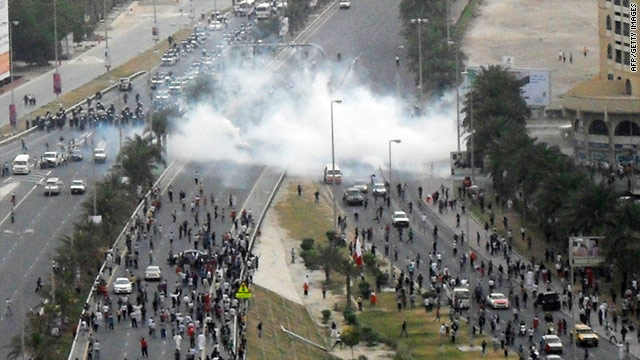الموضوع منقول من عدة ايميلات
ومجموعات بريدية
صورة تظهر عدم إمكانية المستشفى لإسعاف المصابين في البحرين

إستخدام الرصاص الحي ضد المتظاهرين

مرتزقة النظام الخليفي في جامعة البحرين



Witnesses: King supporters confront Bahrain students
By the CNN Wire Staff
March 13, 2011 -- Updated 1143 GMT (1943 HKT)

Bahraini police fired tear gas to disperse protesters demonstrating near Pearl Square on Sunday.
STORY HIGHLIGHTS
- About 5,000 university students demonstrate against the government
- It's one of several protests in Bahrain Sunday, eyewitnesses say
- U.S. Defense Secretary Robert Gates visits the strategically important kingdom
- Bahrain has been hit by weeks of protests as unrest sweeps the Arab world
RELATED TOPICS
About 150 supporters of the royal family tried to get onto the campus, but only some managed to get in. An unknown number of people were injured, but it's not clear how many or how badly.
Security forces tried to prevent the regime supporters from entering the campus, and allowed people to leave the grounds but not to enter.
The tense standoff was one of at least three protests Sunday against the rulers of the small Gulf kingdom triggered by popular demonstrations that brought down the long-time presidents of Tunisia and Egypt earlier this year.
The latest protests came a day after America's defense secretary said he's "convinced" that Bahrain's royal leaders are "serious about real reform and moving forward," but emphasized that they must move quickly.
Defense Secretary Robert Gates was visiting the restive and strategically important island kingdom, where he huddled with King Hamad and Crown Prince Salman and talked about the importance of engaging with opposition forces.
"I think that the concern now is that it's important that they have somebody to talk to and that the opposition be willing to sit down with the government and carry this process forward," he said.
On Sunday, some 250 young people organized a protest in front of Bahrain Financial Harbor in the capital Manama.
Text messages exchanged between them and others in the area warned of regime supporters approaching from Muharak, another island, but it's not clear the warnings are accurate.
Police and anti-riot squads stationed near the harbor fired tear gas and rubber bullets at protesters, leaving 20 injured, according to Salmanya Hospital. Al Wasat cameraman Mohammed Al-Mukharaq was among the seriously injured, his editor said.
Many protesters mobilized to block off King Faisal highway to prevent the pro-regime groups from entering Bahrain's main island. Some security officers asked them to disband and open the highway, and they complied.
Bahrain, which sits in the Persian Gulf and is the base of the U.S. Fifth Fleet, has been wracked by anti-government protests for weeks.
Sunni Muslims -- even though they are a minority in the kingdom -- dominate the government of Bahrain.
The Shiite Muslim majority has staged protests in recent years to complain about discrimination, unemployment and corruption, issues they say the country's Sunni rulers have done little to address.
Many of them are in the anti-government coalition that has been demanding reform as part of the eruption of discontent sweeping across the Arab world for the past several months. They have staged dramatic protests and camped out in the capital's Pearl Roundabout
Initially, protesters took to the streets of Manama to demand reform and the introduction of a constitutional monarchy. But some are now calling for the removal of the royal family that has led the Persian Gulf state since the 18th century.
Bahrain is in the shadow of Iran, a predominantly Shiite country and antagonist of Bahrain's close ally, the United States.
But Gates told reporters Saturday he "expressed the view that we had no evidence that suggested that Iran started any of these popular revolutions or demonstrations across the region."
However, he said, there's evidence that Iranians "are looking for ways to exploit" the protracted processes unfolding in the region, "particularly in Bahrain."
Three hard-line groups in the Gulf kingdom -- the Haq, Wafa and Bahrain Freedom Movement -- have united and called for the ruling family to step aside, they announced this week.
The new coalition is calling for a democratic republic with no ruling family -- a step further than other opposition groups, which are calling for a constitutional monarchy.
It appeared the hard-line groups represented a minority of the protesters at the roundabout.
In response to the protests, the government has promised to build 50,000 new housing units and hire an additional 20,000
police officers, roughly doubling the size of the force. Members of Bahrain's majority Shiite Muslim community are not allowed to join the force.
Bahrain's king reshuffled his Cabinet last month as protesters continued to call for reforms. He has also touted a "national dialogue" and urged Bahrainis "to engage in this new process" and "move away from polarization."
Journalist Mansur Al Jumri and CNN's Christine Theodorou contributed to this report.
http://edition.cnn.com/2011/WORLD/meast/03/13/bahrain.protests/#| |
ليست هناك تعليقات:
إرسال تعليق